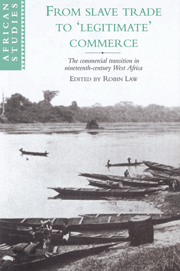 From Slave Trade to 'Legitimate' Commerce
From Slave Trade to 'Legitimate' Commerce Book contents
- Frontmatter
- Contents
- List of contributors
- List of abbreviations
- Introduction
- 1 The initial ‘crisis of adaptation’: the impact of British abolition on the Atlantic slave trade in West Africa, 1808–1820
- 2 The West African palm oil trade in the nineteenth century and the ‘crisis of adaptation’
- 3 The compatibility of the slave and palm oil trades in Dahomey, 1818–1858
- 4 Between abolition and Jihad: the Asante response to the ending of the Atlantic slave trade, 1807–1896
- 5 Plantations and labour in the south-east Gold Coast from the late eighteenth to the mid nineteenth century
- 6 Owners, slaves and the struggle for labour in the commercial transition at Lagos
- 7 Slaves, Igbo women and palm oil in the nineteenth century
- 8 ‘Legitimate’ trade and gender relations in Yorubaland and Dahomey
- 9 In search of a desert-edge perspective: the Sahara-Sahel and the Atlantic trade, c. 1815–1900
- 10 The ‘New International Economic Order’ in the nineteenth century: Britain's first Development Plan for Africa
- Appendix The ‘crisis of adaptation’: a bibliography
- Index
7 - Slaves, Igbo women and palm oil in the nineteenth century
Published online by Cambridge University Press: 21 September 2009
- Frontmatter
- Contents
- List of contributors
- List of abbreviations
- Introduction
- 1 The initial ‘crisis of adaptation’: the impact of British abolition on the Atlantic slave trade in West Africa, 1808–1820
- 2 The West African palm oil trade in the nineteenth century and the ‘crisis of adaptation’
- 3 The compatibility of the slave and palm oil trades in Dahomey, 1818–1858
- 4 Between abolition and Jihad: the Asante response to the ending of the Atlantic slave trade, 1807–1896
- 5 Plantations and labour in the south-east Gold Coast from the late eighteenth to the mid nineteenth century
- 6 Owners, slaves and the struggle for labour in the commercial transition at Lagos
- 7 Slaves, Igbo women and palm oil in the nineteenth century
- 8 ‘Legitimate’ trade and gender relations in Yorubaland and Dahomey
- 9 In search of a desert-edge perspective: the Sahara-Sahel and the Atlantic trade, c. 1815–1900
- 10 The ‘New International Economic Order’ in the nineteenth century: Britain's first Development Plan for Africa
- Appendix The ‘crisis of adaptation’: a bibliography
- Index
Summary
Like many of the other papers in the present collection, this one engages with the arguments of Tony Hopkins. Indeed, it was inspired by the experience of sitting in his Masters' class some fifteen years ago and hearing him lament the shortage of research on smallholders. In his view ‘the modern economic history of West Africa’ is in large part the history of their efforts in developing agricultural export production, efforts which were truly heroic given their limited access to capital, the ‘traditional tools’ and family labour on which they relied, and the long-standing local dominance of slave-using warriors and merchants, who continued to threaten both their peace and their profits. Given the well-documented importance of smallholders in twentieth-century West Africa, it seemed a pity that so little was known about them in the nineteenth. In particular, it was difficult to test two of Hopkins' assumptions: that free smallholder, as opposed to large-scale, slave-based, export production was significant from the start; and that the smallholder households of the nineteenth century were similar in their production techniques and social structure to their ‘modern’, mid twentieth-century counterparts.
- Type
- Chapter
- Information
- From Slave Trade to 'Legitimate' CommerceThe Commercial Transition in Nineteenth-Century West Africa, pp. 172 - 194Publisher: Cambridge University PressPrint publication year: 1995
- 7
- Cited by


